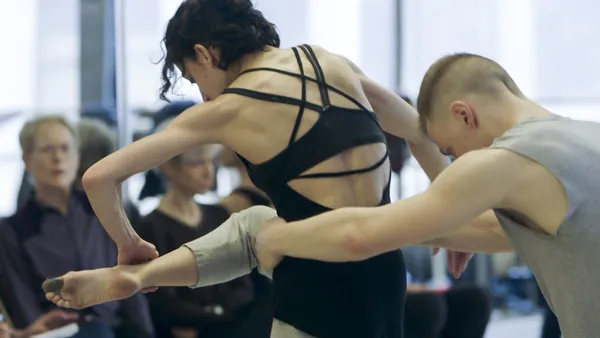Eye For Film >> Movies >> If The Dancer Dances (2018) Film Review
If The Dancer Dances
Reviewed by: Jennie Kermode

In the tide of history, not all forms of art have the same chance of survival. Much like the oral tradition in storytelling, dance is something that exists only in the moment. Even film can't capture it fully, and even a perfect, three dimensional recording would struggle to retain the knowledge vital to recreating the movements involved. For a dance to survive, it has to be passed from one choreographer to another, generation by generation - and like an orally transmitted story, it then has a tendency to mutate. If The Dancer Dances follows renowned choreographer Stephen Petronio as he strives to recreate Merce Cunningham's 1968 work RainForest with a group of the finest modern dancers in New York.
On the face of it this is a simple, observational documentary. It's shot almost entirely within the confines of a single dance studio. Interviews take place off to one side but of the focus is on the dancers themselves as they rehearse, exploring one set of strenuous moves after another. Maia Wechsler's camera picks out every detail of the dancers' bodies, every fluid muscle and taught sinew, the mechanics of balance and motion. Viewers who dance themselves will find this compelling. With relatively little explanation given, however, there's less for the average viewer to connect with.
Should we always attempt to preserve art in its original state or is a little bit of mutation - evolution - a healthy thing? If we try to preserve something to the letter, do we risk losing the spirit of it as a changing cultural context means audiences cease to connect with it in the same way? Petronio's cast includes the first African American woman ever to dance in the piece. A costume has to dyed specially to match her skin tone. Her body is not, we are told, what the very particular Cunningham sought in his female dancers, though no-one can be left in any doubt about the quality of her work. Meanwhile, another dancer explains that in his time Cunningham would never had any physical contact between male dancers. Men and women were restricted to carefully coded roles in a way that now seems quite unnatural. Though Petronio doesn't change who jumps and who lifts, interactions are much more relaxed, giving the individual dancers more flexibility in a piece that is very much about sensuality and touch.
Released just over a century after Cunningham's birth, the film also incorporates reflections on his legacy, Petronio noting that it was seeing the master's work that initially inspired him to pursue a dance career. We see archive clips of Cunningham at work during the years of his physical decline, directing dancers even when he was no longer able to walk. The emotion at the core of his work comes through strongly. Initially focused on composition alone, the present day dancers gradually begin to perform on another level, letting that emotion come through, memorising what their bodies have to do so that their minds are free and they can become immersed in their characters.
Perhaps film can never really capture the essence of dance, but Wechsler does the next best thing and captures what it means to those involved in its creation. In the process she captures something that is perhaps rarer, an aspect of the creative process which touches on the sublime.
Reviewed on: 27 Apr 2019
















